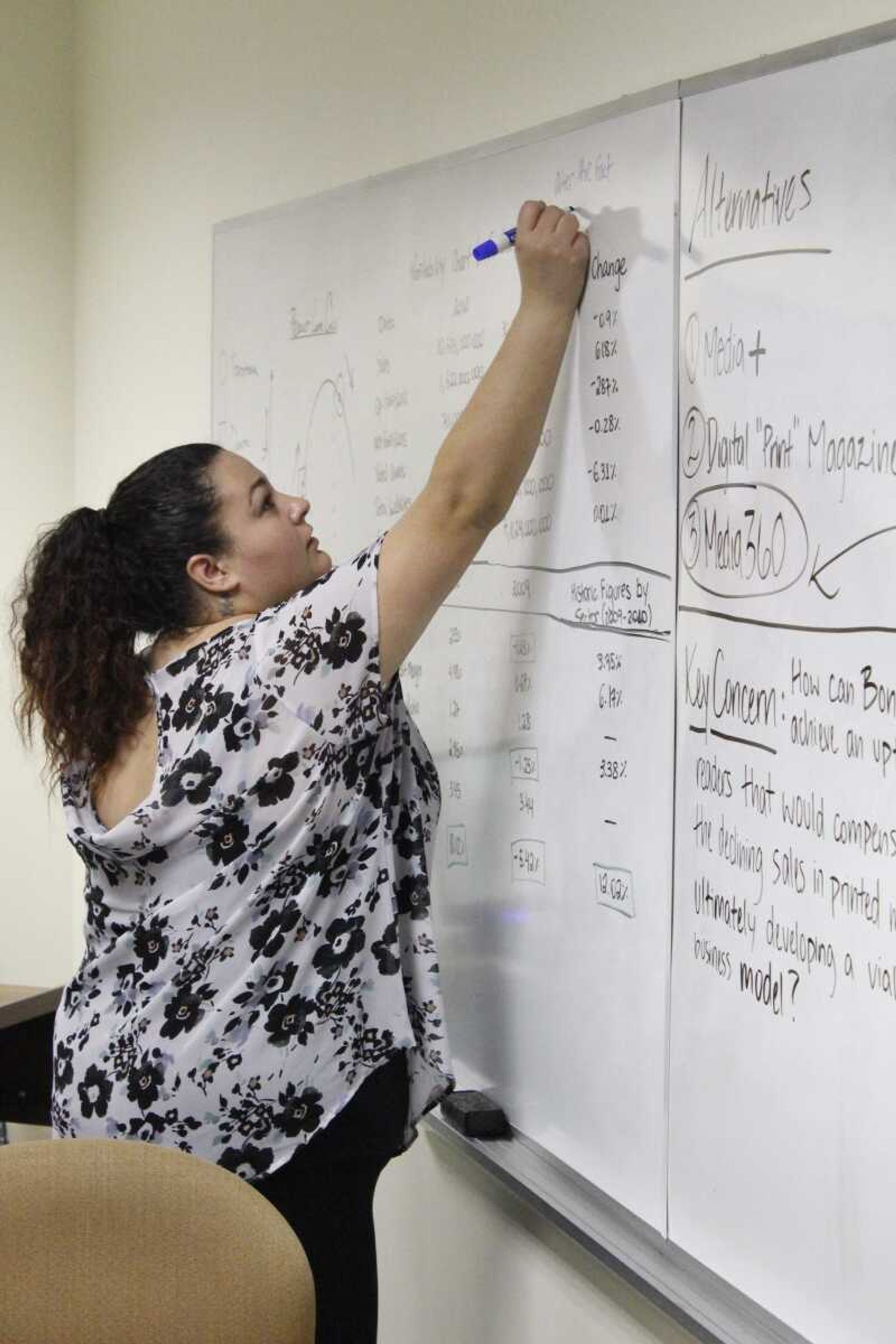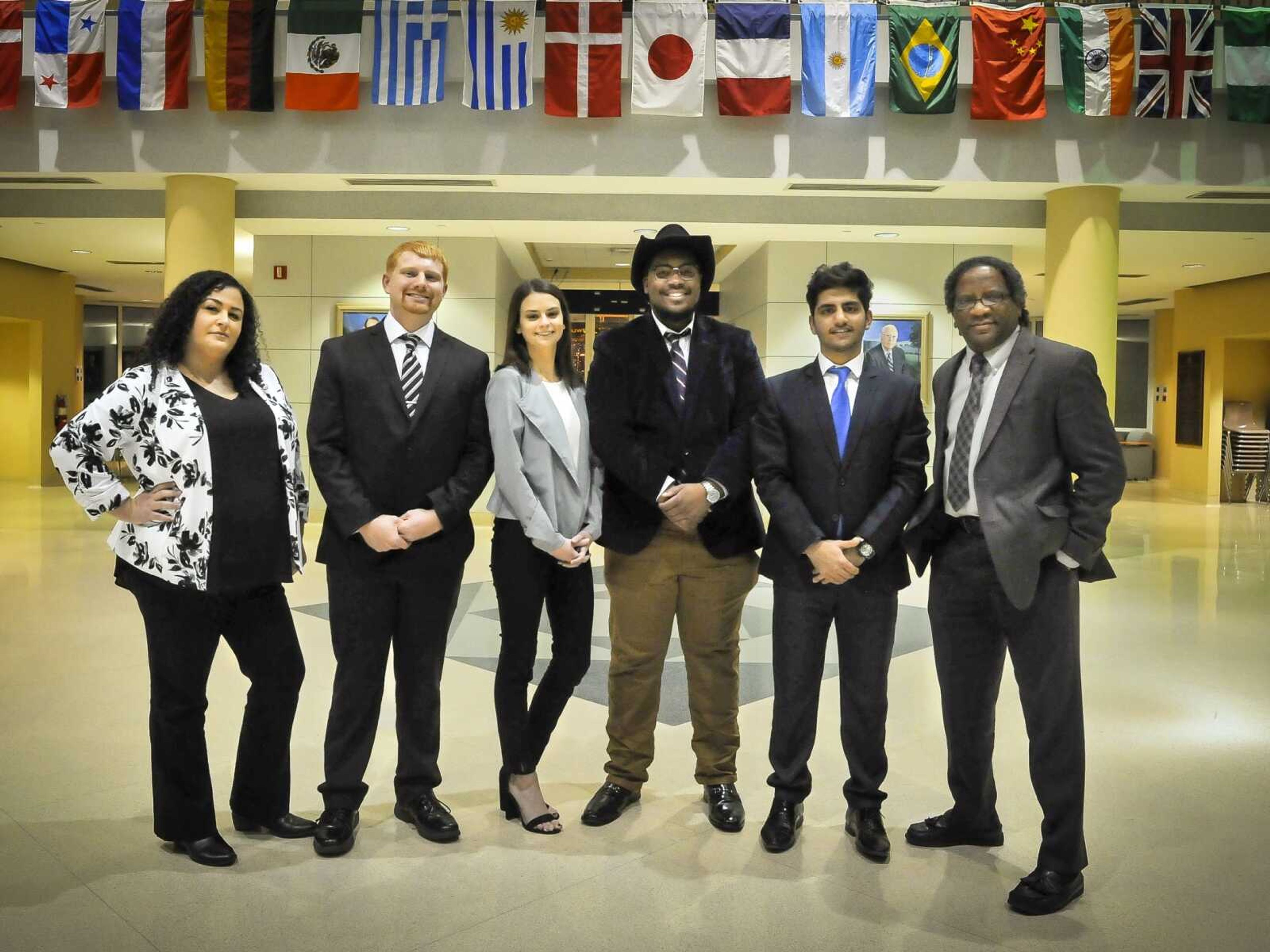SEMO team to compete in 2020 international business competition
Four Southeast Missouri State University students will soon have the chance to represent their school on the world's stage. On Dec. 6, the Harrison College of Business and Computing at Southeast got some important news: They had again qualified among the top business schools in the world to compete in the Network of International Business Schools Worldwide Case Competition...
Four Southeast Missouri State University students will soon have the chance to represent their school on the world's stage. On Dec. 6, the Harrison College of Business and Computing at Southeast got some important news: They had again qualified among the top business schools in the world to compete in the Network of International Business Schools Worldwide Case Competition.
Southeast is the only United States school ever to win first place at NIBS, and this year, the students -- Madison Francis, Bhavya Narula, Zach Kalmer and Dominick Gillette -- will have a chance to defend that honor in Germany and bring home a second title.
For the last two years, Southeast has earned fifth place in the world. The school has not earned the championship title since 2012.
The NIBS competition takes place March 1 through 6 at Heilbronn University of Applied Sciences in Heilbronn, Germany. Teams from across the world compete in a qualifying round for the 16 available spots at the worldwide case competition.
To qualify, teams from each university had eight hours to review an assigned case and prepare a written report containing an analysis and recommendations. They were not allowed to use the internet or any additional resources for their analysis and completed the competition without leaving the room in which they were assigned. The reports were then analyzed by a panel of judges chosen by the host school.

For the last 12 years, Southeast has consistently been one of those teams.
"We are a perennial qualifier," said Willie Redmond, professor of economics and director of international business programs at Southeast. "Southeast has established itself in this case-competition world as one of the leading schools in the world."
Under the direction of Redmond and NIBS alumna and adviser Sarah Monteiro, the students have spent hours on end preparing for the competition. Redmond is the NIBS coach and has traveled with Southeast teams to the case competition for more than a decade.
The students -- most of whom have not shared a single class during their time at Southeast -- have an array of educational backgrounds, including hospitality management and international business, cybersecurity and economics, accounting and finance, and corporate communication and entrepreneurship.
This variance is something the students see as an advantage.
"It's really interesting to see ... all of our knowledge tie together," Francis said. "Our knowledge supports each other and it makes for a good case analysis."
Once in Germany, the team will compete against other teams in groupings of four schools each.
Assuming they make it through to the final round, the students will be given four-hour cases March 2 and 3, and two three-hour cases March 4. They will take Thursday off, and the three-hour semi-final and four-hour final rounds take place March 6.
The cases don't necessarily increase in difficulty from one day to the next, but Redmond noted they are "pretty difficult all the way through."
The students will spend several hours with one another examining facts and developing solutions, a written report and a presentation. They will be judged on identification of the primary issue, background analysis, identification of key concerns, creation of alternative solutions and how well they evaluated and chose from those solutions.
Between the weekends they have yet to spend practicing and the time they will spend together in Germany, the foursome knows disagreements are inevitable.
Actually, they thrive on dissenting ideas.
"We all have leadership qualities," Narula said. "And sometimes it creates conflicts between us."
"It's really a family dynamic that we always fuss and bicker at each other, but we still get along at the end of the day," Gillette said.
"It's always constructive," Francis said. "At the end of the day, it's nothing personal. I think we're just a better team for it."
"You always have to come together after the end of the argument because you have to keep moving forward," Kalmer said. "If you're going to be stubborn, you're just hindering the whole team."
"I think we could argue for the full eight hours," Francis said of the qualifying round, to which her teammates laughed.
Redmond said, in his experience, winning teams are those not afraid to speak up when they believe a better alternative exists.
"Quite honestly, the best teams that I've had are the ones that every one of them think they're smarter than the other ones in the room," Redmond said as the students looked at each other and laughed. "Seriously. They laugh, but there's just no time for following. ... If all you're going to do is sit and follow, then somebody else should be sitting in your chair."
Among the 16 teams that qualified, Canada is represented by teams from five schools. Redmond said Canada typically has a strong presence in the international competition due to its curriculum, which he said is mostly case-based. By comparison, Redmond said Southeast is more focused on students learning concepts.
But the students who take the international trip to NIBS are learning far beyond the concepts they've picked up in class.
Monteiro said her time on the NIBS team was the "best learning experience" of her undergraduate education.
"The most valuable skills that I've learned for the market nowadays was doing this," Monteiro said looking around the room in which she'd once spent hours training for competitions. "It really teaches you how to deal with real-life problems."
Aside from the chance to apply what they've learned in school, the NIBS Worldwide Case Competition is also a great opportunity to network, Redmond said.
"We get there on Sunday, and by Tuesday or so, it's kind of difficult to tell whose students are whose," Redmond said. "Because they've met each other, [and] they're all hanging out."
They also will get the chance to sight see and experience Germany off campus.
"We've been very fortunate with our previous dean and now our current dean, they really respect the time that [the students] put in," Redmond said, noting the college usually makes sure the NIBS team is able to have some fun outside of the work they'll do.
While the students have much hard work ahead of them, they are quick to point their success back to the guidance of their advisers.
"I would say a lot of credit is due to these two," Francis said. "I mean, we would not have qualified or near qualified at the beginning if we hadn't been coached by Willie and Sarah. ... I think for that, we've just really grown as a team."
For more information, visit nibscasecompetition.org, or call the Harrison College of Business and Computing at (573) 651-2112.
Connect with the Southeast Missourian Newsroom:
For corrections to this story or other insights for the editor, click here. To submit a letter to the editor, click here. To learn about the Southeast Missourian’s AI Policy, click here.






